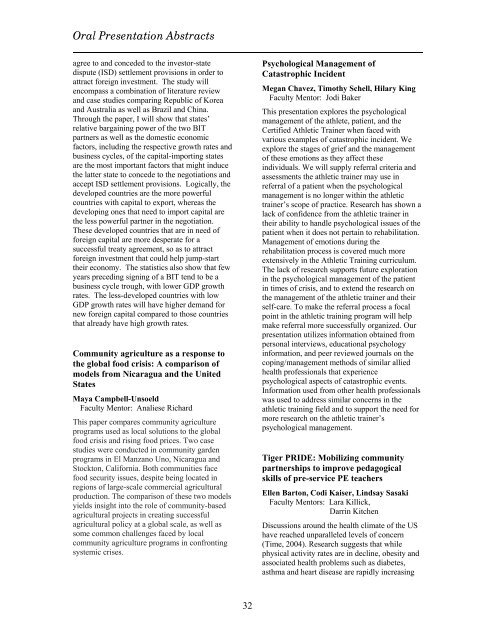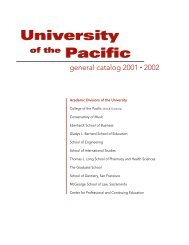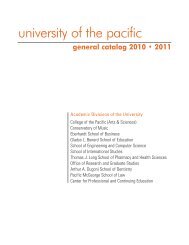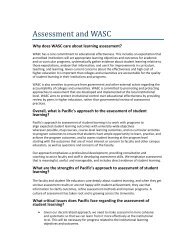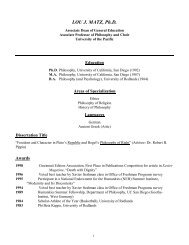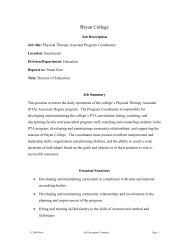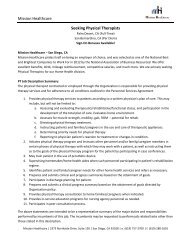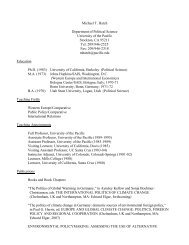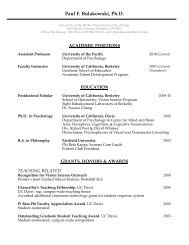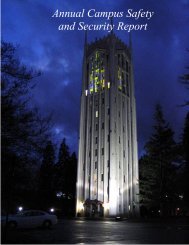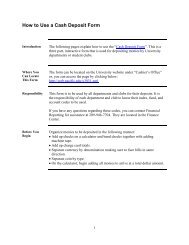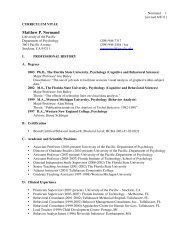purcc 2012 - University of the Pacific
purcc 2012 - University of the Pacific
purcc 2012 - University of the Pacific
Create successful ePaper yourself
Turn your PDF publications into a flip-book with our unique Google optimized e-Paper software.
Oral Presentation Abstracts<br />
agree to and conceded to <strong>the</strong> investor-state<br />
dispute (ISD) settlement provisions in order to<br />
attract foreign investment. The study will<br />
encompass a combination <strong>of</strong> literature review<br />
and case studies comparing Republic <strong>of</strong> Korea<br />
and Australia as well as Brazil and China.<br />
Through <strong>the</strong> paper, I will show that states’<br />
relative bargaining power <strong>of</strong> <strong>the</strong> two BIT<br />
partners as well as <strong>the</strong> domestic economic<br />
factors, including <strong>the</strong> respective growth rates and<br />
business cycles, <strong>of</strong> <strong>the</strong> capital-importing states<br />
are <strong>the</strong> most important factors that might induce<br />
<strong>the</strong> latter state to concede to <strong>the</strong> negotiations and<br />
accept ISD settlement provisions. Logically, <strong>the</strong><br />
developed countries are <strong>the</strong> more powerful<br />
countries with capital to export, whereas <strong>the</strong><br />
developing ones that need to import capital are<br />
<strong>the</strong> less powerful partner in <strong>the</strong> negotiation.<br />
These developed countries that are in need <strong>of</strong><br />
foreign capital are more desperate for a<br />
successful treaty agreement, so as to attract<br />
foreign investment that could help jump-start<br />
<strong>the</strong>ir economy. The statistics also show that few<br />
years preceding signing <strong>of</strong> a BIT tend to be a<br />
business cycle trough, with lower GDP growth<br />
rates. The less-developed countries with low<br />
GDP growth rates will have higher demand for<br />
new foreign capital compared to those countries<br />
that already have high growth rates.<br />
Community agriculture as a response to<br />
<strong>the</strong> global food crisis: A comparison <strong>of</strong><br />
models from Nicaragua and <strong>the</strong> United<br />
States<br />
Maya Campbell-Unsoeld<br />
Faculty Mentor: Analiese Richard<br />
This paper compares community agriculture<br />
programs used as local solutions to <strong>the</strong> global<br />
food crisis and rising food prices. Two case<br />
studies were conducted in community garden<br />
programs in El Manzano Uno, Nicaragua and<br />
Stockton, California. Both communities face<br />
food security issues, despite being located in<br />
regions <strong>of</strong> large-scale commercial agricultural<br />
production. The comparison <strong>of</strong> <strong>the</strong>se two models<br />
yields insight into <strong>the</strong> role <strong>of</strong> community-based<br />
agricultural projects in creating successful<br />
agricultural policy at a global scale, as well as<br />
some common challenges faced by local<br />
community agriculture programs in confronting<br />
systemic crises.<br />
Psychological Management <strong>of</strong><br />
Catastrophic Incident<br />
Megan Chavez, Timothy Schell, Hilary King<br />
Faculty Mentor: Jodi Baker<br />
This presentation explores <strong>the</strong> psychological<br />
management <strong>of</strong> <strong>the</strong> athlete, patient, and <strong>the</strong><br />
Certified Athletic Trainer when faced with<br />
various examples <strong>of</strong> catastrophic incident. We<br />
explore <strong>the</strong> stages <strong>of</strong> grief and <strong>the</strong> management<br />
<strong>of</strong> <strong>the</strong>se emotions as <strong>the</strong>y affect <strong>the</strong>se<br />
individuals. We will supply referral criteria and<br />
assessments <strong>the</strong> athletic trainer may use in<br />
referral <strong>of</strong> a patient when <strong>the</strong> psychological<br />
management is no longer within <strong>the</strong> athletic<br />
trainer’s scope <strong>of</strong> practice. Research has shown a<br />
lack <strong>of</strong> confidence from <strong>the</strong> athletic trainer in<br />
<strong>the</strong>ir ability to handle psychological issues <strong>of</strong> <strong>the</strong><br />
patient when it does not pertain to rehabilitation.<br />
Management <strong>of</strong> emotions during <strong>the</strong><br />
rehabilitation process is covered much more<br />
extensively in <strong>the</strong> Athletic Training curriculum.<br />
The lack <strong>of</strong> research supports future exploration<br />
in <strong>the</strong> psychological management <strong>of</strong> <strong>the</strong> patient<br />
in times <strong>of</strong> crisis, and to extend <strong>the</strong> research on<br />
<strong>the</strong> management <strong>of</strong> <strong>the</strong> athletic trainer and <strong>the</strong>ir<br />
self-care. To make <strong>the</strong> referral process a focal<br />
point in <strong>the</strong> athletic training program will help<br />
make referral more successfully organized. Our<br />
presentation utilizes information obtained from<br />
personal interviews, educational psychology<br />
information, and peer reviewed journals on <strong>the</strong><br />
coping/management methods <strong>of</strong> similar allied<br />
health pr<strong>of</strong>essionals that experience<br />
psychological aspects <strong>of</strong> catastrophic events.<br />
Information used from o<strong>the</strong>r health pr<strong>of</strong>essionals<br />
was used to address similar concerns in <strong>the</strong><br />
athletic training field and to support <strong>the</strong> need for<br />
more research on <strong>the</strong> athletic trainer’s<br />
psychological management.<br />
Tiger PRIDE: Mobilizing community<br />
partnerships to improve pedagogical<br />
skills <strong>of</strong> pre-service PE teachers<br />
Ellen Barton, Codi Kaiser, Lindsay Sasaki<br />
Faculty Mentors: Lara Killick,<br />
Darrin Kitchen<br />
Discussions around <strong>the</strong> health climate <strong>of</strong> <strong>the</strong> US<br />
have reached unparalleled levels <strong>of</strong> concern<br />
(Time, 2004). Research suggests that while<br />
physical activity rates are in decline, obesity and<br />
associated health problems such as diabetes,<br />
asthma and heart disease are rapidly increasing<br />
32


